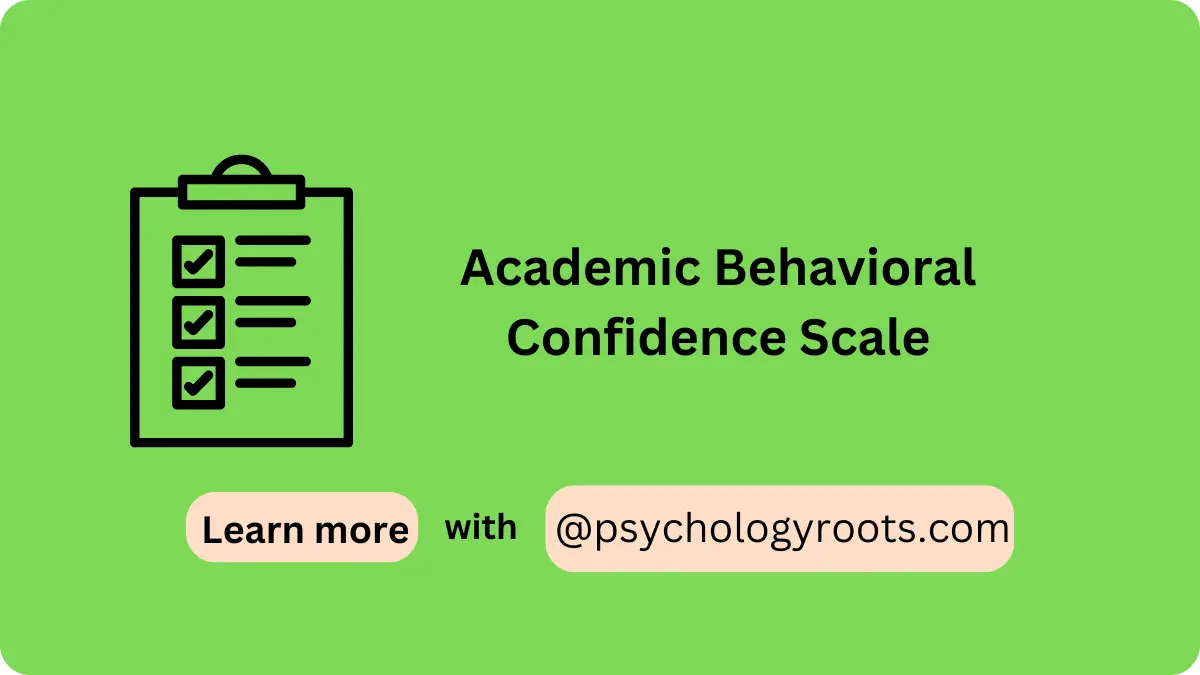Table of Contents
Academic Behavioral Confidence Scale
Here in this post, we are sharing the “Academic Behavioral Confidence Scale”. You can read psychometric and Author information. We have thousands of Scales and questionnaires in our collection (See Scales and Questionnaires). You can demand us any scale and questionnaires related to psychology through our community, and we will provide you with a short time. Keep visiting Psychology Roots.
About Academic Behavioral Confidence Scale
Scale Name
Academic Behavioral Confidence Scale
Author Details
Paul Sander and Lalage Sanders (2003)
Translation Availability
English

Background/Description
The Academic Behavioral Confidence Scale (ABC), originally termed the Academic Confidence Scale (ACS), was developed by Paul Sander and Lalage Sanders in 2003 to assess college students’ confidence in their ability to perform behaviors critical to academic success. Rooted in educational psychology and self-efficacy theory (Bandura, 1997), the ABC measures students’ self-perceived ability to engage in academic tasks, distinguishing it from measures like the Individual Learning Profile (ILP), which focuses on confidence in specific academic skills (Pulford & Sohal, 2006). Cited in Sander and Sanders (2003), the ABC aligns with research on academic self-regulation and motivation, emphasizing actionable behaviors over general self-beliefs.
The ABC consists of 24 self-report items, each beginning with “How confident are you that you will be able to…,” rated on a 5-point Likert-type scale (1 = “Not at all confident” to 5 = “Very confident”). Items cover behaviors like studying effectively, attending classes, and verbalizing ideas in academic settings. Scores are averaged across all items (range: 1-5), with higher scores indicating greater confidence. Factor analyses have identified four subscales: Grades (confidence in achieving desired marks), Studying (confidence in study habits), Verbalizing (confidence in expressing ideas), and Attendance (confidence in class participation). Validated in university student samples (N = 97-1688), the ABC predicts academic outcomes like exam performance and self-regulated learning, and it informs interventions for student support.
Psychologists, educators, and higher education researchers use the ABC to evaluate students’ confidence in academic behaviors, identify barriers to success, and design interventions to enhance study skills and engagement. Its focus on behavioral confidence and robust psychometrics are strengths, though limited cross-cultural adaptations and specificity to higher education may restrict broader application.
Administration, Scoring and Interpretation
- Obtain a copy of the scale from authorized sources, such as Sander and Sanders (2003) in Psychology Teaching Review (Vol. 12, pp. 29-39), ensuring ethical use permissions.
- Explain the purpose to respondents, noting that it assesses confidence in academic behaviors to support educational success, emphasizing anonymity and using clear, non-judgmental language.
- Provide instructions, asking respondents to rate their confidence in performing specific academic behaviors (e.g., “study effectively”) using the 5-point Likert scale, based on their typical experiences.
- Approximate time for completion is 5-7 minutes, given the 24-item format.
- Administer in educational, clinical, or research settings, using paper or digital formats, ensuring a private environment. Oral administration may be used for accessibility.
Reliability and Validity
The ABC has strong psychometric properties, as reported in Sander and Sanders (2003) and subsequent studies. Internal consistency is good, with Cronbach’s alpha coefficients for the total scale ranging from 0.85 to 0.90 and subscale alphas from 0.70 to 0.85 (Sander & Sanders, 2006). Test-retest reliability is moderate to high (r ≈ 0.70-0.85 over 4-8 weeks), indicating stability.
Convergent validity is supported by significant positive correlations with predicted exam marks (r < 0.10, p < 0.05), approaches to learning, self-regulation, and satisfaction with teaching (Sander & Sanders, 2003). Discriminant validity is evidenced by weaker correlations with unrelated constructs, such as general intelligence (r < 0.20). Criterion validity is demonstrated by predicting academic outcomes, including GPA and course persistence. Confirmatory factor analyses (N = 97-1688) support a four-factor structure (Grades, Studying, Verbalizing, Attendance), with 14 of the 24 items forming the most robust solution (Sander & Sanders, 2006). The ABC’s correlations with self-efficacy measures (r ≈ 0.40-0.60) and lower correlations with anxiety (r ≈ -0.30) suggest construct specificity. Pairing with measures like the Motivated Strategies for Learning Questionnaire (MSLQ; Pintrich et al., 1991) can enhance assessment of academic motivation.
Available Versions
24-Items
Reference
Sander, P., & Sanders, L. (2003). Measuring confidence in academic study: a summary report.
Sander, P., & Sanders, L. (2006). Understanding academic confidence. Psychology Teaching Review, 12(1), 29-42.
Important Link
Scale File:
Frequently Asked Questions
What does the Academic Behavioral Confidence Scale measure?
It measures college students’ confidence in performing academic behaviors, such as studying and class participation.
Who can use the scale?
Psychologists, educators, and higher education researchers studying college students.
How long does the scale take to complete?
It takes about 5-7 minutes.
Is the scale specific to certain groups?
It targets college students, with some cross-cultural adaptations.
Can the scale inform interventions?
Yes, its predictive validity supports interventions for academic skills and engagement.
Disclaimer
Please note that Psychology Roots does not have the right to grant permission for the use of any psychological scales or assessments listed on its website. To use any scale or assessment, you must obtain permission directly from the author or translator of the tool. Psychology Roots provides information about various tools and their administration procedures, but it is your responsibility to obtain proper permissions before using any scale or assessment. If you need further information about an author’s contact details, please submit a query to the Psychology Roots team.
Help Us Improve This Article
Have you discovered an inaccuracy? We put out great effort to give accurate and scientifically trustworthy information to our readers. Please notify us if you discover any typographical or grammatical errors.
Make a comment. We acknowledge and appreciate your efforts.
Share With Us
If you have any scale or any material related to psychology kindly share it with us at psychologyroots@gmail.com. We help others on behalf of you.